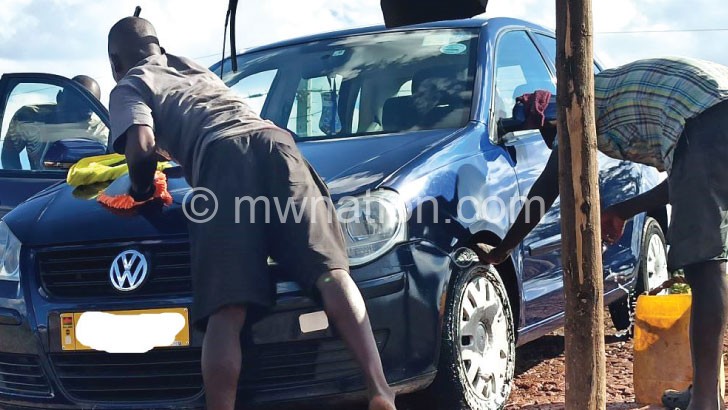Washing cars for survival
Innocent Lino was washing a car on the edge of a roadside wetland when we met in Lilongwe recently. The 30-year-old is one of hundreds of unskilled Malawians cleaning vehicles to beat the pains of massive unemployment in Malawi and the capital city is inundated by youthful Malawians fleeing poverty in rural areas.
“In 2001, I travelled from my village in Nsanje on the southern tip of Malawi to search for job opportunities. I had no papers and no skills needed for decent jobs, but I still gathered the courage to come to the capital city for the good of my family,” he explains.
When he arrived in the sprawling city, Lino quickly discovered that jobs were few and life was tough.

He says: “I didn’t know where to start. After months of searching for jobs, any jobs, I started selling water packaged in small plastic bags. Later I switched o washing vehicles at a fee. Now, this is my life.”
Lino only needed soap, buckets, towels and a nearby well to embark on the business which offers many young people an escape from unemployment and poverty.
The youth in Malawi remain a dominant age group and the 2018 census shows almost three-quarters of the population is aged below 35. However, the International Labour Organisation (ILO) reports that almost one in five young people aged 18 to 35 remain unemployed despite actively searching for jobs.
ILO reports that young people who are neither attaining marketable skills in school nor the labour force are particularly at risk of both labour market and social exclusion.
“The only option I had was to find some space for a car wash. I got a spot at a bus stop near Shoprite in Area 3. My colleagues and I did all we could to maintain our customers and find new ones,” he states.
However, things changed in 2004 when Lino lost his business spot to Operation Dongosolo, a state-sponsored demolition of business structures built too close to roads and outlawed vending locations.
The worst-hit were small-scale businesses owned the youth who dominate the informal sector.
“As a result of the demolition exercise, some colleagues relocated to Tsoka flea market to start other businesses, but I did not know what to do next. I returned to Nsanje to figure out my next move,” he says.
However, life in the village proved difficult as poverty deepened. From 2006 to 2017, he survived on piecework which could not meet his family needs.
When he returned to the city, his turnaround came during a no easy walk in the township along the Lilongwe West Bypass Road—an idea to open a carwash business sparked in his mind and he had to go for it.
He says: “With some experience in the business I call my profession, I knew that increased activity, construction and traffic meant more customers for me,” he recalls.
He operated with the help of his peers “who just wanted a meal for the day”.
“I help people who can help themselves. When they help me, I help them meet their needs for the day,” he states.
Some of his loyal customers travel long to get their vehicles cleaned by the man who urges carwashers to treat their clients with respect, honesty and integrity.
One customer, Louis Gondwe, says time has come for Malawians to start supporting the youth who are helping themselves instead of relying on alms or switching to crime, drug abuse and alcoholism.
“I have known this man for a long time and I know my car is safe with him. But with just a little help, his business can flourish. For example, given a bank loan, he can establish a well-equipped carwash and build on his name and experience to make it big,” says the happy customer.
Joseph Mbewe, who often works at the carwash, believes in sweating hard for what one needs.
“I don’t want to become a beggar or a criminal. There is no sweet without sweat. I am happy we have a place where we make clean money for our needs,” he says.
And Lino hopes young men will live to tell their success story. He currently owns a grocery shop from the proceeds of cleaning vehicles and plans to build a decent house.
However, his line of business remains controversial as city councils often hit at them for encroaching road reserves and causing an eyesore. Others are evicted to restore sanity in the city.
“It’s not easy to restore order in the city as poverty and unemployment keep pushing people to use every opportunity they get to generate income for survival,” says Catherine Kunje, deputy director for health and cleansing services at Lilongwe City Council.
The 2019 Malawi Labour Force Survey shows that from 2013 to 2019, about 130 000 young Malawians were entering the labour market each year, but the the formal sector only produces approximately 30 000 jobs.
Instead, many young Malawians continue to venture into low-paying work in the informal economy.





